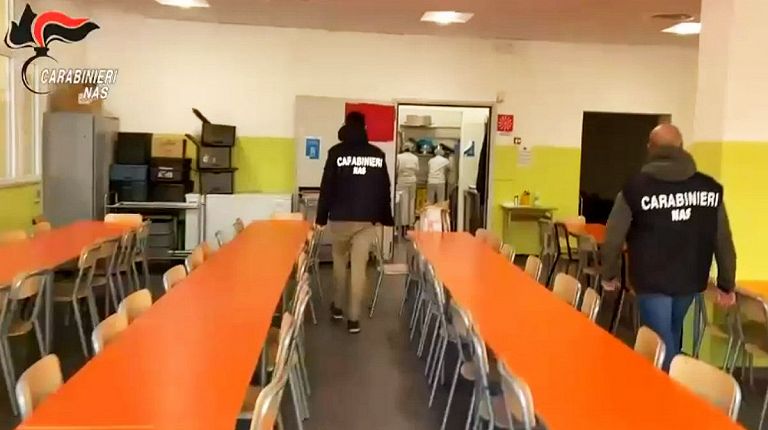Frozen products instead of fresh ones, "fake" Parmesan passed off as Dop, a gym bathroom transformed into a crockery and kitchen utensils deposit in a school in Potenza and even a "pasta and potatoes", but without potatoes: administered to the pupils of an institute in the province of Caserta. But the irregularities found in the wide-ranging controls by the Carabinieri of the Nas, do not differentiate between North, South and Center: in an equal institute of Bergamo, the military find the use of expired fresh pasta and flour, with a storage term exceeded by a year, in three other canteens of as many school complexes in the province, ascertained "poor hygienic conditions", use of expired foods and poorly frozen groceries. While in Treviso, 40 kg of meat, fruit and vegetables and milk were seized, partly expired, partly stored in anonymous packaging: the manager of the restaurant was accused of serious hygiene and health deficiencies.
Nas
Operation of the Carabinieri of the Nas in school canteens
Mold, on the walls of the kitchen
In the canteen of a primary school in the province of Pavia, water infiltration, the presence of mold, torn ceiling panels were found. But the list is long: in Sassari the legal representative of a cooperative managing the canteen of a kindergarten was referred for having held and administered to the pupils food of different quality from those provided for in the contract of the service: "cod and meat precooked and frozen instead of fresh ones", generic eggs instead of organic ones. In Naples, the administration and sale of food and beverages of the refreshment point of a classical high school was suspended, where poor hygienic conditions were found with reference to the equipment and environments for storing and administering food: half a quintal of confectionery and food products seized. Immediate stop also for the cooking center supplier of a school complex in Bari: serious sanitary and structural deficiencies. During the inspection in a meal production laboratory of the company awarded the school lunch service of a kindergarten in Catania, 17 kg of food preparation without indication of origin, used for breading food, were seized. The presence of thawed meat without temperature control is also contested. In the refectory of another comprehensive school in Catania, some heat-sealed packages of meals were seized, due to the presence of foreign bodies such as hair.
Nas
Operation of the Carabinieri of the Nas in school canteens
The balance is worrying: three hundred and forty-one irregular school canteens, nine closed kitchens.
Inspected "1,058 collective catering companies in school canteens", of all levels, from kindergartens to high schools, both public and private. Among the companies audited, 341 irregularities were found, equal to 31% of the total controls, ascertaining 482 criminal and administrative violations, with penalties of 240 thousand euros, contested for "violations in food management and hygiene conditions in the premises where meals are prepared", in the lack of compliance in quality and quantity with the requirements established by the tender specifications and in the "regularity of use of workers and relative possession of adequate qualification and professional preparation".
Carabinieri
Controls of the Carabinieri Nas at school canteens
22 canteen service managers held responsible for the crimes of fraud and non-compliance in public supplies, the possession of food in poor condition and non-compliance with the legislation on safety in the workplace have been referred to the judicial authority. The investigations of the Nas have revealed "the fraudulent use of lower quality ingredients" than that agreed in the supply contracts stipulated with the Municipalities, such as Parmigiano PDO replaced with other cheeses, conventional eggs instead of organic farming and frozen products instead of fresh ones.
Nas
Operation of the Carabinieri of the Nas in school canteens
The majority of the infringements, equal to 85%, concerned administrative sanctioning aspects such as structural and plant deficiencies of the premises used for the preparation of meals, the failure to implement self-control, traceability and the presence of allergens, fundamental elements to prevent possible episodes of intoxication and allergic reactions, even more significant in sensitive groups of school users.

